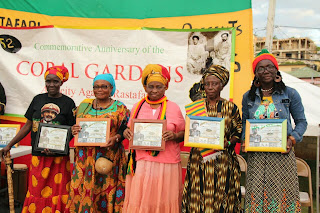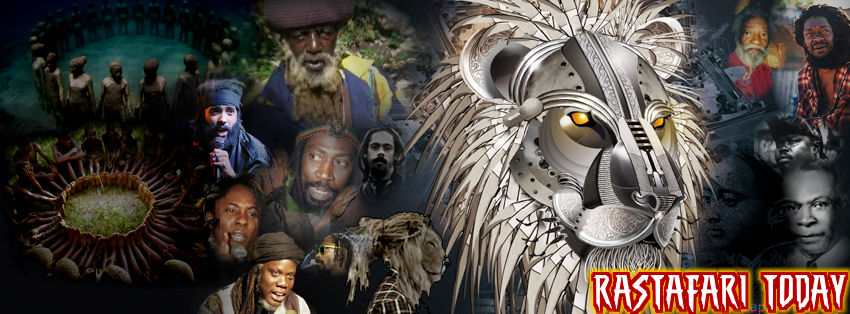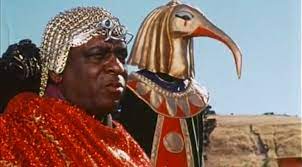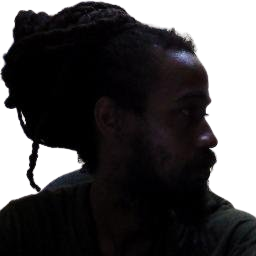"I was born in a system that doesn't give a fuck about you or me or the life of our lovely kids, I keep my guns load just in case thing get frig, that's just the way I live, that's me yeah-a, as is!"
~Sizzla Kalonji
What comes to mind when one considers existentialism? Many academics and philosophers will conjure images of moody and morose French thinkers in turtleneck sweaters, holding palaver at tables in cafés in Paris, puffing Gauloises and endlessly sipping coffees as they gaze into the catacombs of the humanity's collective soul. However, there is more to it than that. Existentialism continues to be the most popular and best recognized school of philosophy, and consequently what I wrote my UWI, Mona Philosophy B.A. thesis on, way back in 2004. I wish I could reread that paper now. I believe it was something like Rastafari as Existential philosophy.

When I wrote my paper I really wrote it from a perspective of justifying Rastafari as existential philosophy in a new sense rather than examine it as an ideology which follows the tradition of black existentialism, well maybe I did do an Aime Césaire and Franz Fanon link but knowing what I know now, I could have made a more robust connection. Or maybe I hope I did after it was reviewed for edits and such. But where much of the black existentialism and mid 20th century existentialism was atheist in nature and departed from it's religious roots. Rastafari while incorporating Akan existential notions of self carries black existentialism back to a religious place while maintaining and advancing it in modern times and even venturing into the realm of Afrofuturism, as we consider our existential plight in the future. But what exactly is existentialism defined as: A philosophy that emphasizes the uniqueness and isolation of the
individual experience in a hostile or indifferent universe, regards
human existence as unexplainable, and stresses freedom of choice and
responsibility for the consequences of one's acts, by The American Heritage® Dictionary of the English Language, 5th Edition.
Existentialism had a religious birth in Denmark and went through Atheist reform in France. Similarly precolonial West African religious traditions and African phenomenology birth a unique African existentialism and one could contend or argue that many Black or Africana existential philosophies (for example, Lewis Gordon’s Africana philosophy of existence, Frantz Fanon’s Sociogeny, and Howard Thurman’s Religious Thought) were somewhat Europeanized, and often secularized, versions of precolonial West African spirituo-analysis, phenomenology and existentialism. Just as European existential philosophy undergo atheist transformation it seems to have been mirrored in the African existentialism's transition to modern black or Africana existential philosophy.

With it being clear that existentialism wasn't birthed in France as most tend to think but actually in the 19th century in Denmark, with the highly unorthodox Christian thinker Søren Kierkegaard. He introduced the idea that in our journey through life we have the opportunity to make a ‘leap of faith’, to commit to a belief even though the evidence isn’t there. The majority of later existentialists were not religious. Yet pervasive in their work is the idea and narrative of the hero's choice and dedicated path, which sometimes turns out to be a mistake with serious consequence. This is a persistent current running through existentialist literature and plays. Existentialism, in contrast to much preceding philosophy, insists that existence precedes essence. In other words, there is no such thing as an immutable essence of a human being. Instead, first of all we exist. A notion not too far from Mr. Des Cartes "I think therefore I am."
Existentialism digresses from Des Cartes' skepticism to contend that at birth we are foist into a universe that doesn’t much care about us, and we have to make the best of ourselves – individually and in relation to one another – as we go along. So how does existentialism fit within the context of the African diaspora and its descendants dispersed throughout the Americas who have been facing approximately five centuries of white bigotry, misunderstanding, and racism. Especially as, we strive in our own way to be an acknowledged human beings in a system that only wants to make us less than one. A highly intelligent peoples and civilization, dismantled, enslaved and forced into unacceptable circumstances, yet persisting to recreate ourselves individually and secure some manner of respect and dignity. Alienation and the human condition are crucial issue to the ethos of existentialism; alienation is something we of African descent know so well. An alienation identified in Reggae songs like "Jamaican in New York" by Shinehead which covers and recaptures the sense of alienation identified by Sting in his original "English Man in New York"... as they both croon "I am an alien in New York."
Alienation at The Rivers of Babylon
"How can we sing King Alpha's song in a strange land?"
The heyday of existentialist thought may be over, but many people still find that existentialism resonates with literature and movies of all kinds, and sometimes with real life too. In particular, the idea that meaning and values are not sewn into the fabric of the universe but that we must invent them for ourselves has become ever more widely held and during the middle decades of the twentieth century, existentialism dominated the European philosophical and literary scene. Prominent theorists such as Jean Paul Sartre, Albert Camus, and Maurice Merleau-Ponty put the experience of history, alienation, and the body at the center of philosophical and literary life. It should be no surprise, then, that existentialism appealed to so many Afro-Caribbean and African-American thinkers of the same period and after. Black thinkers critically transformed European existentialist ideas as is evidenced in the work of black existentialists such as Aime Césaire, Frantz Fanon, George Lamming, Richard Wright and Wilson Harris.

The enslaved and colonized people of the America are credited with a unique cognitive, ethical and social agency in the face of a structure that presents different existential challenges to the ability of the Caribbean people to realize their person-hood and live a worthwhile life. The Caribbean people have always possessed agency and have used this to overcome existential challenges at different phases of their history. The question whether they have always succeeded in doing this is a different question.
Rastafari as a manifestation of African retention is the memory of the Jamaican people and is the reminder to the children of enslaved people of who we were and where we are going. Rastafari retains African philosophy and philosophical threads in the Caribbean ethos. In our current circumstance Rastafari works to prod, rattle and rethink our thinking (Unlearn), to current our "Miseducation" as Lauryn Hill put it, a "miseducation" that has lead to systemic disinformation and misinformation in the west. Rastafari serve to inform and change our practices as humans in institutions, politics, and the personal, legal and social paradigms. Rastafari via livity (lifestyle) demonstrate how African, Aboriginal, native ideology and ethos be can used for
transformation of existence, anti-racism and critiques of alterity,
resistance, pedagogy as well as political action. Rastafari is living philosophy which maintains the cognitive link from African phenomenological and spirituo-analytical traditions via African retention, yet it also carries on the modern philosophical quests and issues of modern black existentialists. A philosophy that vivifies a culture, a region, music, arts and religion. Rastafari activists, academics and actors can be found at the vanguard of discourse on decoloniality, reparations, the politics of race, gender and identity, among others.
"The power of philosophy floats through my head, Light like a feather, heavy as lead"
—Bob Marley
"Emacipate yourselves from mental slavery, none but our self can free our minds"
~Bob Marley
"Babylon gi dem a ride fi dem money get dem funny, and den brainwash dem pon dem western journey"
~Sizzla Kalonji
In Black Skin, White Masks, Fanon argued that the colonial situation created an “existential deviation” in the psyche of the Afro-Caribbean. This deviation was the result of racially induced “aberrations of affect” that relocated the Afro-Caribbean in an antiblack world from which he or she must be extricated. I n I contend Rastafari is the movement that engenders that extrication. If one takes a hermeneutical, phenomenological approach to the Sacred Scriptures emerging from Rastafari then one will see that it is a “Third World” Liberation Theology. Rastafari theology focuses on a postcolonial interpretation and reimagination of rituals. The adoption in Rastafari livity of the Bible and of apocryphal books such as the Kebra Nagast, The Holy Piby, and The Promised Key explores the meaning of Black identity and of Liberation Theology.
The usage of the term "Babylon" in Rastafari liberation discourse is
distinct from the exodus motif normally associated with theologies of
liberation. This usage comes mainly from Marcus Garvey's notion of a
"Black Zionism" that pictured Zion as a place of restoration. In its
usage in the prophetic books of Jeremiah and Isaiah, Zion serves as the
foil for Babylon and in many instances the two topoi are paired. The Rastafari reading of the biblical texts, more
so the prophets and not the book of Revelation, generated the notion of
Babylon as the evil empire; any place outside of Africa as Babylon, and
the British Empire as Babylon with Zion as its counterpoint. Rastafari repurposes the dark matters of existence in Babylon– anxiety, depression, despair, death – into the service of self-flourishing idea of Zion.
My Black Existential Reading List:
- The Souls of Black Folk - William Edward Burghardt Du Bois
- Black Skin, White Masks - Frantz Fanon
- Toward the African Revolution - Frantz Fanon
- Eight Men: Short Stories - Richard Wright
- Existentia Africana - Lewis R. Gordon
- Notebook of a Return to the Native Land - Aime Cesaire
This article explores the intersection of #Existentialism and #Rastafari
philosophy, delving into topics such as #Philosophy, #Spirituality,
#PersonalGrowth, #Identity, #Consciousness, #ExistentialCrisis,
#SelfDiscovery, #IndividualFreedom, #SocialJustice, #Ethics, #Morality,
#ExistentialDread, #Redemption, #ExistentialAngst, #Enlightenment,
#InnerPeace, #SelfRealization, and #UniversalLove.






















.png)

.png)




